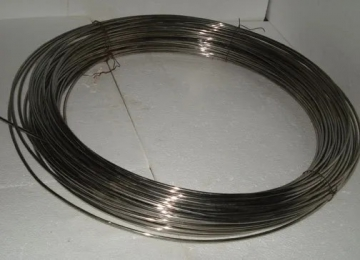
TA4G titanium alloy is an industrial pure titanium alloy with many excellent properties. First, it has a smaller density, which allows it to reduce the weight of structures in applications. Secondly, TA4G titanium alloy has a high melting point, which allows it to maintain structural stability in high temperature environments. In addition, TA4G titanium alloy also has excellent corrosion resistance and can resist the erosion of many chemicals. In addition, it has a higher specific strength, which means it can withstand greater loads at the same weight.
TA4G titanium alloy is an α-type titanium alloy with high strength, low density, good corrosion resistance and toughness. Its tensile strength is between 350-550MPa, its plasticity is very good, and it is easy to process, shape and weld.
Pure titanium TA4G chemical composition (%)
Material | TA4G | |||||||
chemical composition | Fe | C | N | H | O | Other individual | Other total | Ti |
≦0.5 | ≦0.08 | ≦0.05 | ≦0.015 | ≦0.4 | ≦0.1 | ≦0.4 | margin | |
Physical properties of pure titanium TA4G
density | 4.51 g/cm3 |
melting point | 1660℃ |
Mechanical properties of pure titanium TA4G
Alloy status | tensile strength | Specifies non-proportional elongation strength | Elongation |
| Rm N/mm2 | RP0.2N/mm2 | A5 % |
Solution treatment | ≥240 | 140-310 | ≥30 |
Heat treatment of TA4G titanium alloy
The following are some recommendations for heat treatment of TA4G titanium alloy:
Annealing treatment: The recommended annealing temperature is 670-720°C and the time is 0.5-2 hours. Through annealing, the residual stress of the material can be eliminated and the plasticity and toughness of the material can be improved.
Stress Relief Annealing:. For TA4G titanium alloy, you can choose an annealing system of 530-550℃, 0.5-1 hour or 470-490℃, 2-4 hours. Through stress relief annealing, the stress concentration of the material can be reduced and the stability and reliability of the material can be improved.
Welding of TA4G titanium alloy
Commonly used methods for welding TA4G titanium alloy include argon arc welding, plasma welding and resistance welding. These welding methods can effectively join TA4G titanium alloy and maintain its good properties.
It should be noted that when using TA4G titanium alloy, appropriate heat treatment and welding processes should be selected according to specific application requirements to ensure optimal performance and reliability.
Processing of TA4G titanium alloy
For the processing of TA4G titanium alloy, the following are some suggestions:
Melting: TA4G titanium alloy usually requires two vacuum meltings, at least one of which is performed in a vacuum consumable electrode arc furnace. The production of castings usually takes place in vacuum shell furnaces.
Heating treatment: During the heat treatment process, attention needs to be paid to maintaining a neutral or weak oxidizing atmosphere to prevent titanium from absorbing impurities such as oxygen, hydrogen and nitrogen, reducing plasticity and affecting performance. Reducing atmosphere should not be used, and hydrogen heating is strictly prohibited.
Hot processing: TA4G titanium alloy can be hot processed such as forging, extrusion, rolling and drawing on common equipment. The temperature range of thermal processing is generally between 800 and 900°C.
Cold working: During cold working, when the cold working rate reaches a certain value (such as 30% to 60%), intermediate annealing should be performed to restore the plasticity and strength of the material.
It should be noted that the specific processing technology should be determined based on the specific application requirements and material properties. In actual operations, relevant processing specifications and standards should be followed to ensure the stability of processing quality and material properties.
Application fields of TA4G titanium alloy
TA4G titanium alloy has wide applications in many fields. Here are some of the main application areas:
Aerospace field: TA4G titanium alloy is commonly used in aircraft frames and skins, as well as engine accessories and other components. Its high strength and corrosion resistance make it an ideal material in the aerospace industry.
Shipbuilding industry: TA4G titanium alloy is used in the shipbuilding industry to manufacture pipes, valves, pumps and other parts that are resistant to seawater corrosion. Its corrosion resistance and lightweight properties make it ideal for marine environments.
Seawater desalination system: TA4G titanium alloy is used to manufacture components in seawater desalination systems, such as heat exchangers, pump bodies, distillation towers, coolers, agitators, tees, impellers, etc. Its corrosion resistance and high temperature properties make it suitable for desalination applications.
Chemical industry: In the chemical industry, TA4G titanium alloy is often used to manufacture various chemical equipment, such as heat exchangers, towers, reactors, etc. Its corrosion resistance and high temperature properties make it an ideal material in chemical equipment.
In short, TA4G titanium alloy is widely used in aerospace, shipbuilding, seawater desalination, chemical industry and other fields due to its excellent properties, providing reliable and efficient solutions for these fields.

